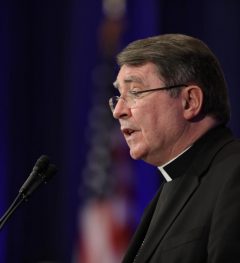
Archbishop Christophe Pierre, apostolic nuncio to the United States, speaks during the fall general assembly of the U.S. Conference of Catholic Bishops in Baltimore Nov. 11, 2019. (CNS photo/Bob Roller)
BALTIMORE (CNS) — The bishop’s ministry and mission, and how he forges communion, was the message in Archbishop Christophe Pierre’s address to the U.S. bishops Nov. 11 in Baltimore.
The “ad limina” reports submitted to the Vatican in advance of U.S. bishops’ meetings with Pope Francis and curial officials — indeed, a handful of bishops were already in Rome for these visits — “provide a clear picture of how the church in the United States is carrying out its mission,” said Archbishop Pierre, the Vatican’s nuncio to the United States.
He mentioned “but a few” — in his words — of the challenges bishops face as they gathered in Baltimore for their fall general meeting: “demographic changes; growing numbers of religiously unaffiliated people; the need to engage young people and to build a culture of vocations; welcoming and integration of migrants, especially Hispanics; continuing the fight against all forms of racism; and defending and accompanying the human family.”
Archbishop Pierre said, “Each of us exercises his own specific episcopal ministry, but we also try to work together in a spirit of collegiality as an episcopal body. What are the strengths of this episcopal body, and how is the body serving the needs of the people entrusted to our pastoral care?”
[hotblock]
He suggest collegiality and collaboration as an approach.
“Do you find that you share experiences with brother bishops?” Archbishop Pierre asked. “It is always edifying to find younger bishops discovering a ‘mentor’ among the more senior bishops, or to hear of how ‘more experienced bishops’ have taken the opportunity to share some of their wisdom and experience with younger bishops in a fraternal way.”
Such “collective wisdom,” he added, leads to the notion of communion. “As the ‘ad limina’ visits are upon us, it is good to reflect on the ways in which we exercise our communion with the Holy Father and with the wider church,” Archbishop Pierre said.
The U.S. bishops’ visits “ad limina apostolorum” — to the threshold of the apostles — began Nov. 4 with a group from Massachusetts, Rhode Island, Connecticut, New Hampshire, Maine and Vermont. As the U.S. bishops met in Baltimore Nov. 11-13, the bishops of the New York region were in Rome for their “ad limina” visits.
Throughout the rest of November and in December, January and February, another 13 groups of U.S. bishops were traveling to Rome. The visits should conclude Feb. 22 with the bishops of the Eastern Catholic churches in the United States.
“The pope has emphasized certain themes: mercy, closeness to the people, discernment accompaniment, a spirit of hospitality toward migrants, and dialogue with those of other cultures and religions,” the papal nuncio told the bishops gathered in Baltimore. “Do you believe that these are gradually becoming part of the mindset of your clergy and people?”
[hotblock2]
Archbishop Pierre said the question is particularly apt as, while Pope Francis has been emphasizing mercy, “paradoxically, people are becoming more and more judgmental and less willing to forgive, as witnessed by the polarization gripping this nation.”
Bishops can reflect on communion with the pope in a theological way, he added, but “we ought to examine it practically, namely by measuring to what extent we as individual and our local churches have received the magisterium of Pope Francis,” he added.
“By now, ‘Evangelii Gaudium’ (‘The Joy of the Gospel’) should be the framework for efforts at evangelization,” he continued. “Adopting its missionary impulse and being in a permanent state of mission might represent tangible signs of communion with the Holy Father, for it would show the reception and implementation of his teaching as the key to missionary evangelization.”
Communion also is key between bishop and priest, he said. With more priests from other nations serving in dioceses, “we must investigate how this has affected or is affecting the presbyterate within or respective dioceses,” Archbishop Pierre said.
“Many priests are saying they no longer know one another; others, due to the priest shortage, are forced to live in isolation managing multiple parishes,” he said. “Our episcopal ministry demands that we act as bridges for our priests, attentive to their life and health, spiritual well-being and their sense of priestly identity and fraternity.”
He asked the U.S. bishops: “Are we still zealous for the things of the Lord? While energy levels may diminish with age, hopefully our love for God and his people has increased, along with our gratitude for the grace of the call.”
PREVIOUS: Gomez: Nation has ‘moral obligation’ to keep promise to DACA recipients
NEXT: ‘Faithful Citizenship’ materials reflect pope’s ongoing teaching



Share this story